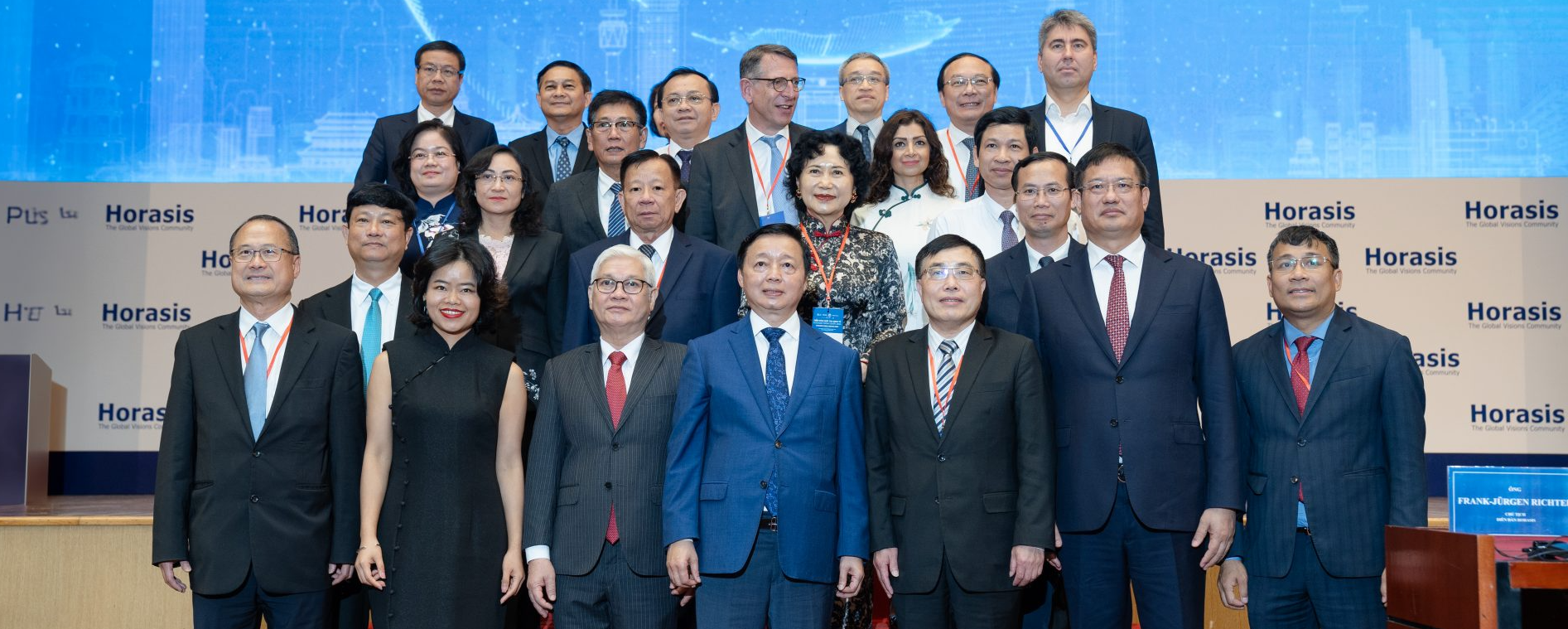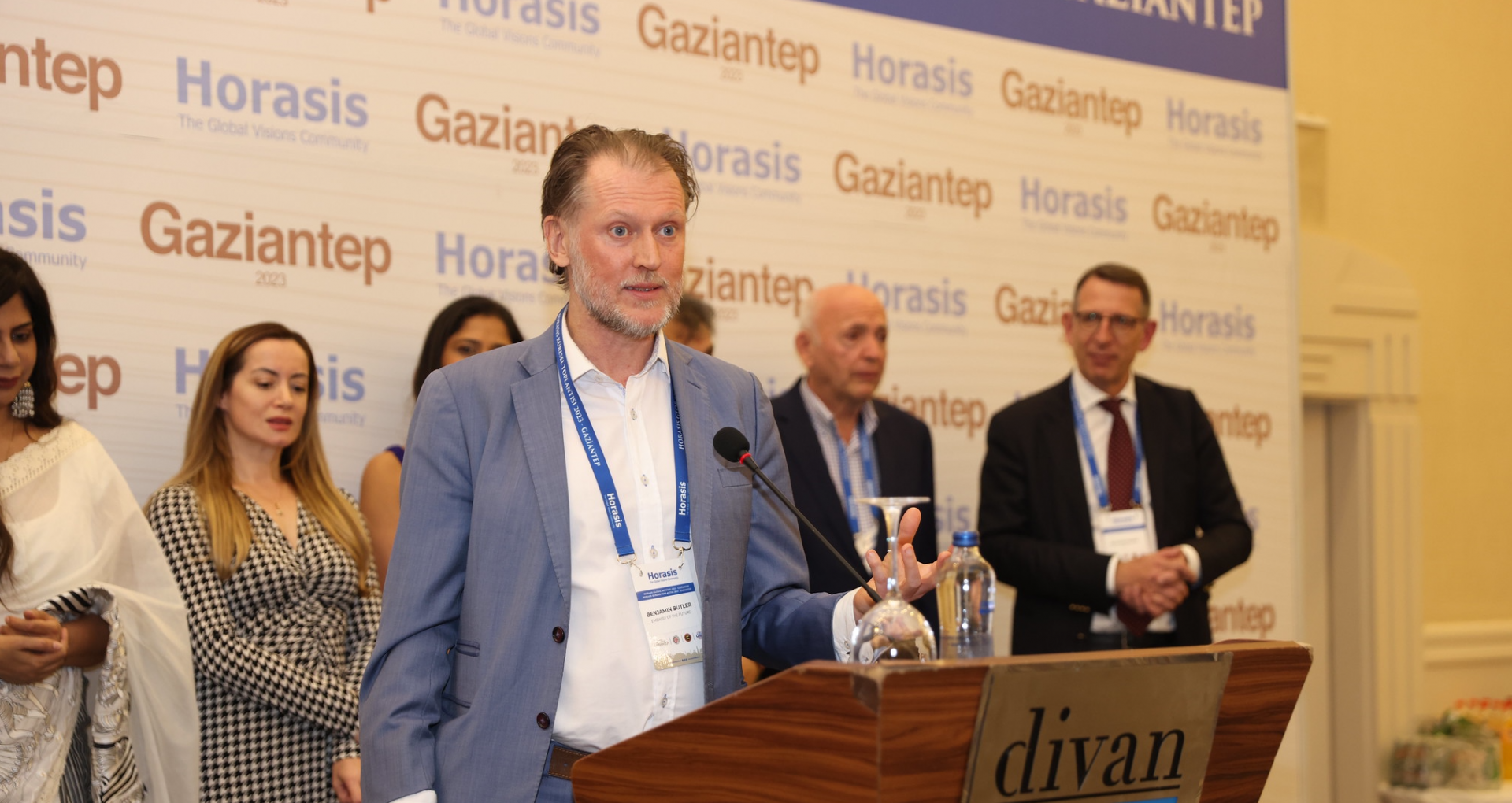Horasis China Meeting 2024 – Report
The 2024 Horasis Chinese Meeting took place in Vietnam – in Binh Duong New City, close to Ho Chi Min City over April 14th and 15th 2024. The meeting was co-hosted by Binh Duong Province, Becamex IDC Corporation and the China Federation of Industrial Economics. The meeting drew together 700 of the most senior members of the Horasis Visions Community, including some of China’s and Vietnam’s best known business leaders.
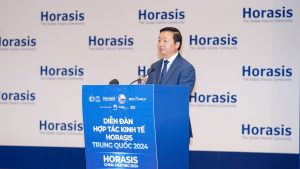
Tran Hong Ha, Deputy Prime Minister, Vietnam, keynoting the meeting
Tran Hong Ha, Deputy Prime Minister, Vietnam opined that the government is sure the Horasis China Meeting creates an opportunity for all parties to share vision, seek opportunities, and strengthen cooperation in innovation, sustainable development, and science and technology. Furthermore, the Vietnamese government will always listen to and create good mechanisms for investors. Initiatives shared at these meeting sessions will help the Government build adaptive policies for integration for the future of the world, including strengthening connectivity and cooperation for the common development goals, not only in Vietnam but also over the globe.
He also shared that the government has made a choice – resolving for the first time in the Party Congress to choose a clean and circular economic model. But he acknowledged that the path to a green economy is fraught with challenges. Chief among them are the technological and financial barriers that stand in the way. A key priority is partnering with companies willing to invest in research and development, transferring technology to advance these goals. Without green research, green implementation and development are impossible. As noted above, China has a large contribution to make in this economic growth sector.
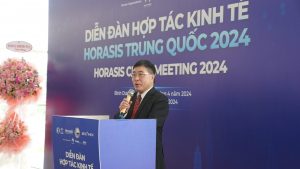
Xiong Meng, Executive Vice Chairman, China Federation of Industrial Economics, China
The location of the Horasis China Meeting rotates annually and in recent years has been held in Las Vegas (2019), Kyiv (2018), Sheffield (2017), Interlaken (2016), Cascais (2015), Como (2014), The Hague (2013), Riga (2012), Valencia (2011) and Luxemburg (2010). With these meetings Horasis aims to portray a systemic view of activities affecting the drivers of China’s economic success and how Chinese businesses interact globally within other nations.
Vietnam, hosting the 2024 Horasis meeting, is presently classified as a middle-income country – having been once one of the world’s poorest nations. Over the 50 years since the end of the Vietnam war, Vietnam has concentrated on several important growth sectors – education being one.
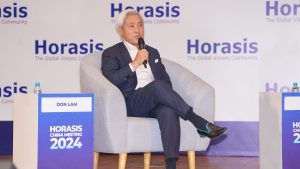
Don Lam, Chief Executive Officer and Founding Partner, VinaCapital, Vietnam
Following governmental reforms through the 1980s it moved from its former highly centralized economic planning to one that is quite mixed: it pursues directed and indicative planning through five-year plans, yet it also supports an open market economy. The two nations – China and Vietnam – are different in many ways: China has a population of 1.4 billion across 10 million km2, with Vietnam having only 100 million occupying 1/3 million km2. China’s average income is about US$13,000 with a cost of living 58% (compared to US=100%), while in Vietnam average income is US$ 4,000 and cost of living is 32%.
It is said Vietnam is a rather like China 10 years ago in terms of middle-class proportionality, income per capita and rate of urbanization. Nevertheless, Vietnam is presently the 35th largest global economy by GDP, and 26th by PPP; and has a demographic dividend expected to last for 15 more years. Vietnam has become Asia’s top performing economy. And its tourism volumes have increased, drawing in luxury hotel brands developing resorts to support this important industry.
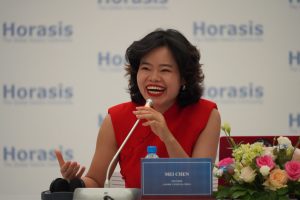
Mei Chen, Founder, Cosmic Citizens, China, speaking about China’s brands
China has achieved a great deal in its recent history – it surpassed several of its Millenium Goals early, taking millions of its people out of poverty. It has vastly renovated and increased its railway network so few of its towns are more than 12 hours apart, which eases the massive congestion of people as they travel home to take national holidays with their families. That same flux of people has powered the vast growth of production of goods from the simple to the highly technical that enabled China to become the manufacturing center for world trade.
And its continuing stress on better education has led to rapid advances in scientific and technological abilities – extending its increasing knowledge of machine learning and artificial intelligence to deliver medical solutions to its more remote regions, to space and ocean exploration, and to reducing its total carbon footprint so helping to reduce global warming.
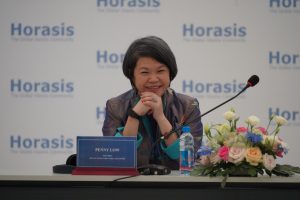
Penny Low, Founder, Social Innovation Park, Singapore, sharing a panel on mindfulness
However, China may be reorienting its focus. President Xi is calling to develop “… new productive forces” – to accelerate advanced manufacturing industries creating high-productivity jobs and thus develop greater national self-sufficiency. China seems to be tackling this effect by removing choke-holds, by inventing technologies the world will need in the future and by upgrading current industries. Meanwhile, the IMF predicts that global growth will be only 3.2% in 2024, and hardly expanding in 2025.
Speaking at the Welcome Lunch Vo Van Minh, Chairman, Binh Duong Province, Vietnam mentioned after he was elected to his post in July 2021, he then spent 2 years implementing Project 06. Following from this work, Binh Duong has achieved many positive results – the entire province has issued citizen identity cards (ID cards) to 100% of eligible people, and has digitized and simplified many administrative procedures within the National Public Service Portal. Xiong Meng, Executive Vice Chairman, China Federation of Industrial Economics, China agreed, affirming advanced technology had greatly enhanced the stability and modernity of the industrial supply chain.

Zhi Peng, Secretary General, Zhongguancun M&A Promotion Association, China
It is necessary to learn from this development experience and steadily promote planning, policy guidance, and talent preparation based on the natural and geographical conditions and regional carrying capacity, so as to promote the long-term sustainable development of regional industries. He also expressed support for deepening economic cooperation between the two countries.
He promised to do everything possible to encourage more Chinese companies to invest and cooperate in Vietnam in the future, especially in Binh Duong province. He said the special traditional friendship and comprehensive strategic cooperative partnership between Vietnam and China have been continuously consolidated and deepened, particularly in the economic sphere, with the sides now discussing further joint work in green energy, climate change, and carbon-neutral initiatives.
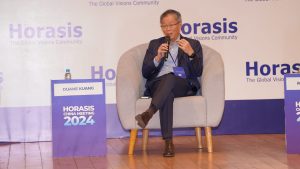
Duane Kuang, Founding Managing Partner, Qiming Venture Partners, China
The Opening Plenary: Rebuilding Globalization presented discussions about inter-Asian and global trade routes that have been rebuilt after the pandemic, with both China and Vietnam poised to become centers of new global trading routes. The panel was chaired by Thai Linh, Chief Executive Officer, Skills Bridge, Vietnam who explained all staffs must be helped to unlock their full potential by being provided with the tools and inspiration to do so. With Zhi Peng, Secretary General, Zhongguancun M&A Promotion Association, China agreed that broad guidance in in global investment and business operation is needed, and must encompass R&D, management training, investment and now AI. Mike Liu, Vice President and Senior Fellow, Center for China & Globalization, China said that professional experience in digital transformation, operational excellence, cross culture leadership development and market growth strategies were needed skills. Which led to Fu Qiang, Chief Engineer, China Sinopharm International Corporation, China stating capacity-building training can have a huge impact. Anson Chan, Chairman and Managing Director, Bonds Group of Companies, Hong Kong noted the senior leaders must have a broad experience to understand the need for globalization. Nhan Huc Quan, General Director of New Toyo Aluminium Paper Packing Co. Ltd, hoped the Government would stabilize lending rates. According to him, this helps enterprises to calculate production costs and control as well as forecast product price changes in the short-term. This, in return, helps curb inflation. The panel agreed that globalization had never ended, in part because we all rely on goods shipped round the world – what is needed is greater economic cooperation in the future so as to reduce disruptive trade disputes and thus permit business leaders to plan long-term.
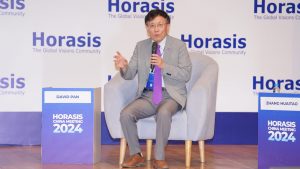
David Pan, Executive Dean, Schwarzman College, Tsinghua University, China
The plenary on Spearheading ESG was incorporated within the TSC-Horasis Initiative ‘Race to Zero’ was chaired by Suneet Puri, President China, TCS, China. He explained that his Chinese operation had to accomplish two major aims – to be in accord with the Chinese government’s aims, and to promote the aims of TCS, especially within the realms of the environment, sustainability and governance. Chris Tay, Founder and Chief Executive Officer, Drink NOD International, China noted that “Made in China” brands are leading the way in terms of quality and design. We must all stay ahead of the curve and meet consumers’ ever-evolving preferences. Such ideas were echoed by Nguyen Quang Huan, Chairman, Halcom, Vietnam stated we must respect our business partners, and competition should be for development instead of eliminating each other. To do this suggested Penny Low, Founder, Social Innovation Park, Singapore we need to call for inclusivity, and sustainability must be complemented by a greater awareness of the impact our actions have on the world around us… mindfulness is at the core of everything. This leads to better sustainability said Bill Kung, Founder and Chief Executive Officer, Ecovane Environmental, China who noted there is a wave of sustainable development based on sustainable value. And it is not just about marketing, but we need to ‘Harness the Market to Bring Social Caring’ opined Bonnie Liao, Executive Director, Social Enterprise Research Academy, Hong Kong.
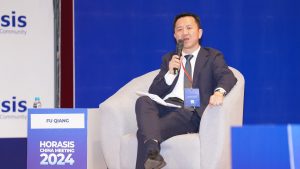
Fu Qiang, Chief Engineer, China Sinopharm International Corporation, China
The plenary on Nurturing Creativity and Innovation followed. It was chaired by Cuong Dang, Partner and Chief Executive Officer, Forbes Vietnam, who noted Vietnam has been building a large and trusted community for business executives. In essence he, and the panel, agreed that creativity and innovation is a global need and must be organized globally while nurtured locally. Claude Béglé, Chairman, SymbioSwiss, Switzerland described how he engaged with firms to create new ventures to develop entrepreneurial companies, in order to reach concrete and tangible results. Dan Cates, Founder, Dan Cates Foundation, USA was convinced people can work together for the betterment of everyone. Duc Dang, Director, Science Technology Industrial Park, Becamex IDC, Vietnam said we want to engage and identify talent and tap into an innovation ecosystem in order to develop the competitive advantage in new ventures. Then, looking globally, Wang Dong, Executive Director, Institute for Global Cooperation and Understanding (iGCU), Peking University, China hoped that instead of a rivalry that splits the world, the United States and China can lead as responsible stakeholders.
Vo Van Minh, Chairman, Binh Duong Province, Vietnam at the Welcome Dinner addressed the delegates and said that by hosting the Horasis China Meeting, Binh Duong hopes to find important solutions, create favorable conditions for entrepreneurs to access development strategies, and intensify new cooperation to promote economic development. And he stated that during this meeting Binh Duong would be granting investment approval decisions and investment registration certificates to 17 domestic- and foreign-invested projects. Xiong Meng, Executive Vice Chairman, China Federation of Industrial Economics, China replied, stating the special traditional friendship and comprehensive strategic cooperative partnership between Vietnam and China have been continuously consolidated and deepened, particularly in the economic sphere, with both sides now discussing further joint work in green energy, climate change, and carbon-neutral initiatives.
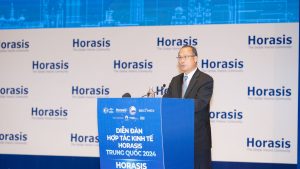
Jonathan Choi, Chairman, Sunwah Group, Hong Kong
Speaking to the theme Vietnam and China Drive Ahead, Nguyen Van Loi, Secretary of the Provincial Party Committee, Binh Duong Province, Vietnam expressed his joy to have Dr Choi as the Honorary Guest of Binh Duong Province to join Horasis 2024, and to observe the burgeoning partnership between Sunwah Group and Becamex IDC. Jonathan Choi, Chairman, Sunwah Group, Hong Kong replied he was proud that advances over the past 55 years in Vietnam had played a significant role in fostering economic cooperation and mutual development between Vietnam and China. Over the years, our two nations have walked hand in hand, fostering economic collaboration and mutual growth. Recent strategic endeavors by our governments have propelled this relationship to new heights: for instance, instigating Sunwah’s Innovation Centre in Ho Chi Minh City that was launched in 2020 to entrepreneurship development. Our bilateral trade has surged, breaking records year after year. Notably, China’s emergence as Vietnam’s largest customer for agricultural, forestry, and fisheries products highlights the depth of our economic ties.
In the plenary discussing the Global Economic Outlook Don Lam, Chief Executive Officer and Founding Partner, VinaCapital, Vietnam noted that, in the context of geopolitical conflicts in the world, the economy has many challenges and uncertainties leading to falling consumer confidence: many people are in a “defensive” position, increasing savings and afraid to invest. Venture capital funds are increasingly difficult to invest in. Tao Yitao, Director, China Center for Special Economic Zones Research, China was anxious that the development process used excessive land resources, and unreasonable housing policies may have pushed up housing prices in China. Currently, China is facing weak consumption pressure after the pandemic, deflationary financial pressure, and a prolonged real estate crisis. She noted that China and Vietnam are two countries with many similarities, so both can learn and share from each other to exploit their strengths, and limit weaknesses in their development process. Yu Jin, Vice President, China National Offshore Oil Corporation (CNOOC), China also noted a double issue – in China as well as Vietnam – human resource training has not kept pace with the development of technology. The issue of human training is the most important in order to grasp and operate technology in the context of the 4.0 industrial revolution. More broadly Felix Zhang, Co-founder, Envision Group, China opined the challenge facing countries around the world today is that geopolitical conflicts are increasingly impacting and greatly affecting their economies. For Asian countries, including China and Vietnam, current short-term challenges are real estate bubbles, public debt, consumption imbalance, high unemployment rate. Long-term challenges are population decline, labor shortage. We must change the development process to keep up with world trends to respond to climate change and grow more sustainably. This Plenary was chaired by Vo Xuan Vinh, Professor, Ho Chi Minh City University of Economics, Vietnam who summarized the session’s speakers agreeing with the need for better human resource training to enhance competitiveness. In addition, we must manage aspects such as green energy supply and better infrastructure. At the same time, it is necessary to focus on building broadband infrastructure, promoting innovation, change, restructuring, and shaping new directions to meet the current green development trend. Shan Baoguo, Deputy President, State Grid Energy Research Institute Co., China noted how cross-region power transmission in China established a multiregional Integrated Resource Strategic Planning Model. The role grid had an important its impact on carbon reduction and power sector development. Cooperation along these lines with Vietnam would benefit both nations as well as reduce emissions with global benefits.
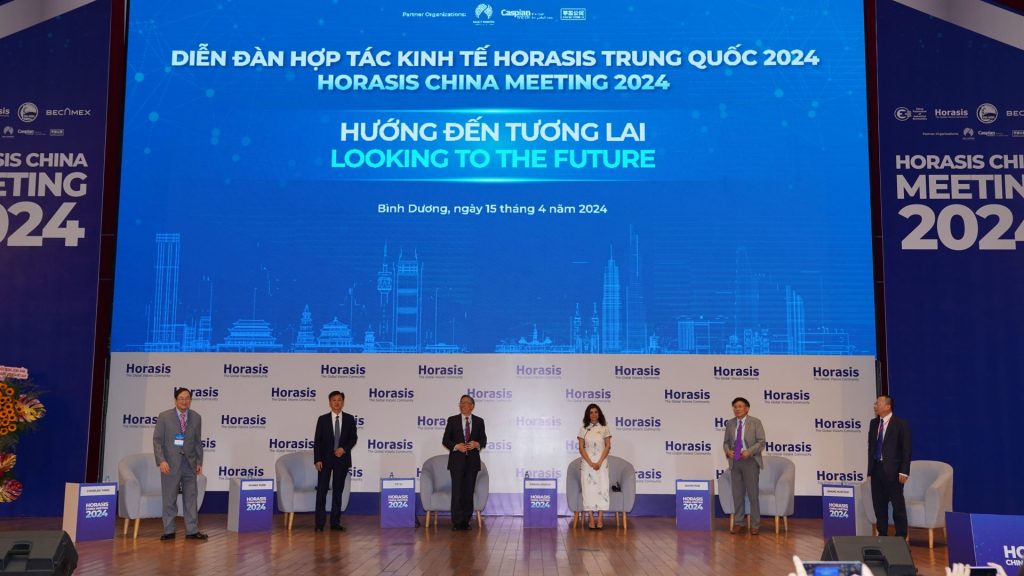
Closing Plenary – Looking to the Future
The plenary discussing The Dynamism of Business in a Changing World was chaired by Alejandro Reyes, Senior Fellow, University of Hong Kong, Hong Kong who suggested people-to-people diplomacy, including dialogues organized by university-based think tanks, has become essential to resolving misunderstandings and managing persistent antagonism. He hopes greater togetherness would support a new dynamism, such ideas were supported by Elisabetta Jiang, Co-founder, Unicorns for Good, Singapore as they bring everyone together and empowers conscious leaders to apply and scale technology for greater good. She hoped this will accelerate deep-tech translation into scalable solutions so catalyze the mindset shift for the regenerative transition. Roger King, Founder and Chairman, ODS Holdings Inc., Hong Kong from his wealth of personal experience said he understood mentoring brings new understanding to businesses. Such actions were at the heart of the new business promoted by Duane Kuang, Founding Managing Partner, Qiming Venture Partners, China who stated that investment in innovative companies was a good way forward. Johan Nyvene, Chairman, Ho Chi Minh City Securities Corporation, Vietnam turned to another necessary cog in creating a dynamic business scene – the upgrade of the Vietnamese stock market – so businesses will have more opportunities to access potential foreign investment. Murat Seitnepesov, Chairman, Integral Group, Switzerland emphasized creative leaders need a wide understanding of business. While Zhang Shoujiang, General Manager, Haier Smart Home Vietnam, Vietnam said the products of each business should fit the market, as well as having leaders who were developing production, constantly improving, using quality materials, high technology, so improving productivity as well as the level of perfection in each product. Diversifying product lines according to each distribution channel is key to success.
The closing plenary was focused on Looking to the Future. It was chaired by J.T. Li, Professor, The Hong Kong University of Science and Technology, Hong Kong recognized through his own wide research upon business there is a need to look beyond profit and success, to promote the betterment of those who are economically weak. This was agreed by Farah London, Founder, Back 2 Business International, United Kingdom who, while having facilitated hundreds of millions in trade and investment around the world, has a particular devotion to caring for the homeless, supporting those with mental health challenges, and helping young people avoid the lure of gang violence through mentoring. Similar sentiments were expressed by David Pan, Executive Dean, Schwarzman College, Tsinghua University, China. He noted that success in business might be measured by dollars, but success in education is measured by happiness. Zhang Huaitao, President, XINFA Group, China echoed his comments and further emphasized the need for education. And there is a ‘something else’ as noted by Charles Tang, President, Brazil China Chamber of Commerce, Brazil. He said his family moved to Brazil when he was just six-years-old, so challenges in the unfamiliar land made him grew up to be a strong and independent man. “Competence and luck bring success. You may be very competent, but if you don’t have luck, you may sometimes not be able to succeed. They go hand in hand.” Finally, Huang Fude, Vice President, JAC International, China reiterated that China would welcome a new stability – new ventures could blossom between China, Vietnam and the world.
It is with gratitude that I thank Binh Duong Province, Becamex IDC and China Federation of Industrial Economics for having had the foresight and commitment to partner with Horasis to make the 2024 Horasis China Meeting such a great success. It is our hope that the Horasis China Meeting will continue to serve as an important platform for stimulating thought and creative solutions. Horasis looks forward to welcoming you back to next year’s edition of the Horasis China Meeting.
